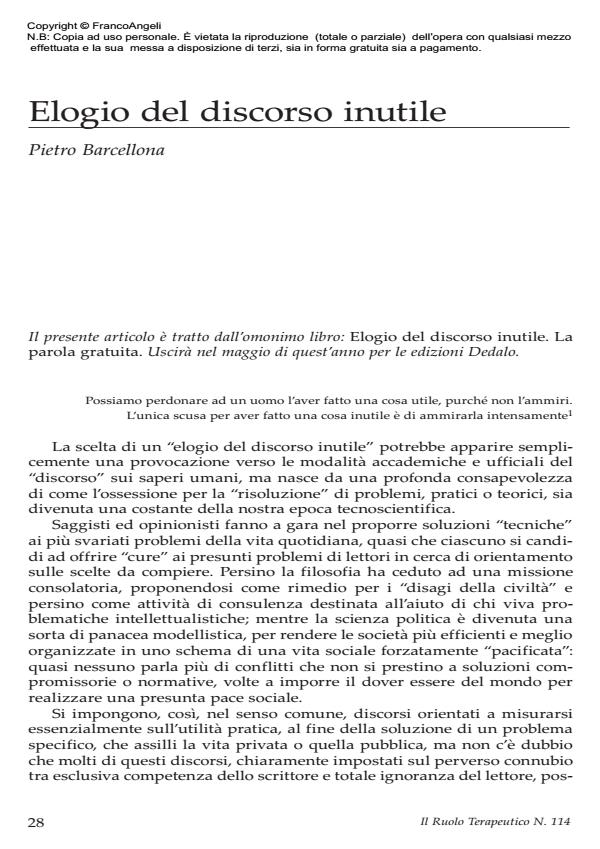Elogio del discorso inutile
Journal title RUOLO TERAPEUTICO (IL)
Author/s Pietro Barcellona
Publishing Year 2010 Issue 2010/114
Language Italian Pages 13 P. 28-40 File size 147 KB
DOI 10.3280/RT2010-114003
DOI is like a bar code for intellectual property: to have more infomation
click here
Below, you can see the article first page
If you want to buy this article in PDF format, you can do it, following the instructions to buy download credits

FrancoAngeli is member of Publishers International Linking Association, Inc (PILA), a not-for-profit association which run the CrossRef service enabling links to and from online scholarly content.
Our technical-scientific era seems obsessed with the resolution of problems, whether they be practical or theoretical. Essayists, editorial writers and even philosophers cannot resist the call of the sirens. The drama is that the preaching consultants who furnish recipes and solutions must vie with an increasing rank of individuals who are disoriented and incapable of making independent decisions. The search for the truth, however, is very different from the search for effective solutions, because it implies the creation of a new mental space, where thoughts and emotions can be transformed into new thoughts and emotions. This is where the choice to praise the "useless" discourse comes in, as belonging to subjective transformations, to affective relationships, freeing mental space from the restraints of social conformity and from the ethic of success. "Useless" are all of those discourses that have to do with the psyche, that produce diversified mental representations and create scenes that are different from the usual ones. It is a matter of interactive, creative dialogues where it is impossible to distinguish between who gives and who receives, and they remind us of Simone Weil’s reflections on taking root, where knowledge is understanding and not learning. The efficacy of understanding has to do with the transformation of the subject through his way of looking at the world. The "useless" discourse uses the language of excess, which helps us to appreciate the incalculable significance of emotions, friendship, of everything for which it is worth losing one’s life in order to be able to find it again enriched. Like Paul’s conversion, each new vision of the world is an irruption of the unthinkable into everyday life. And the unthinkable is witness to the excess. We can consider psychoanalytic voyages to be conversions, because they are structured in time by the creation of new meanings, that retro-act on the subject’s story, throwing it ahead again.
Keywords: Learning, understanding, excess, conversion, resolution
Pietro Barcellona, Elogio del discorso inutile in "RUOLO TERAPEUTICO (IL)" 114/2010, pp 28-40, DOI: 10.3280/RT2010-114003